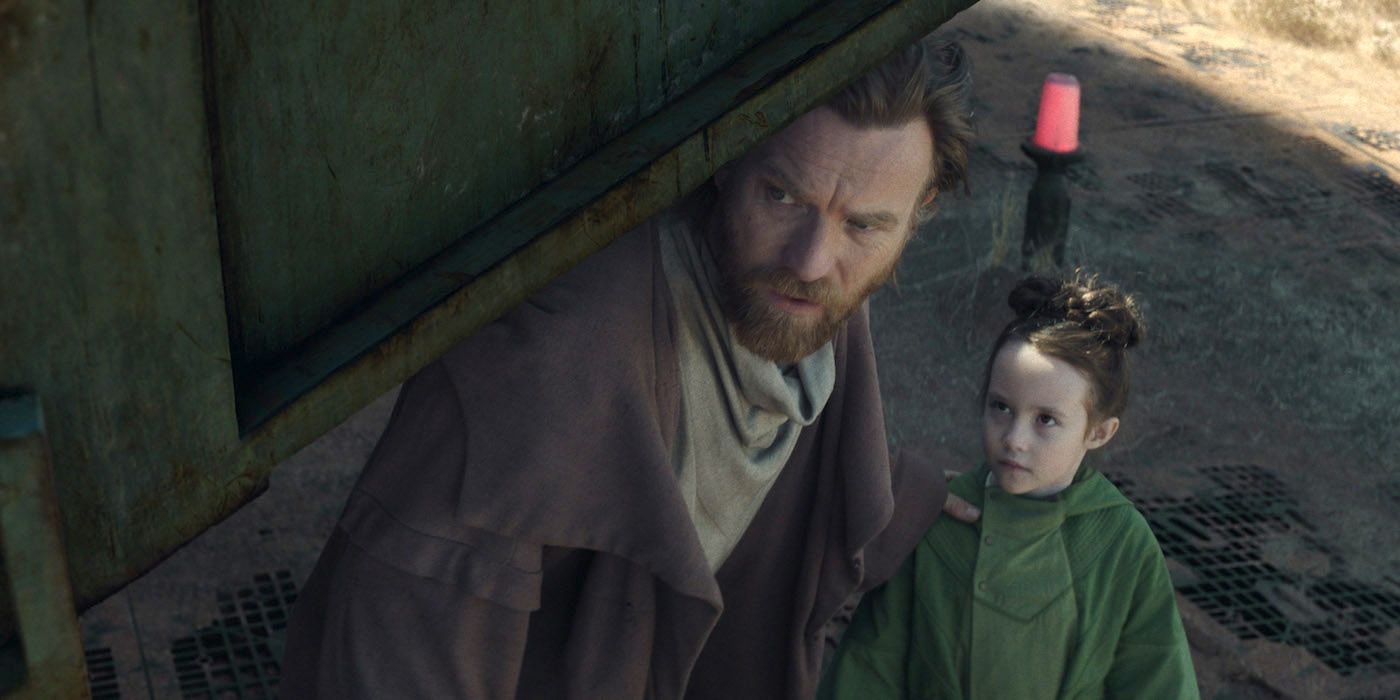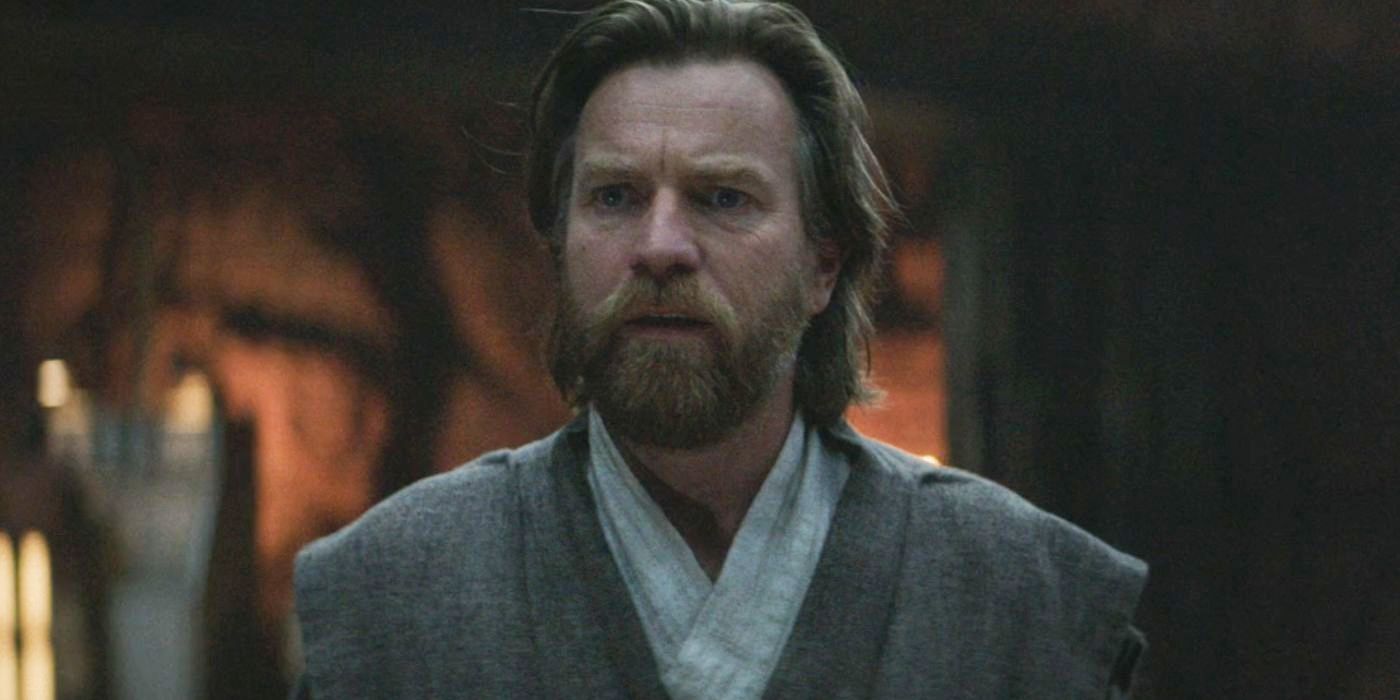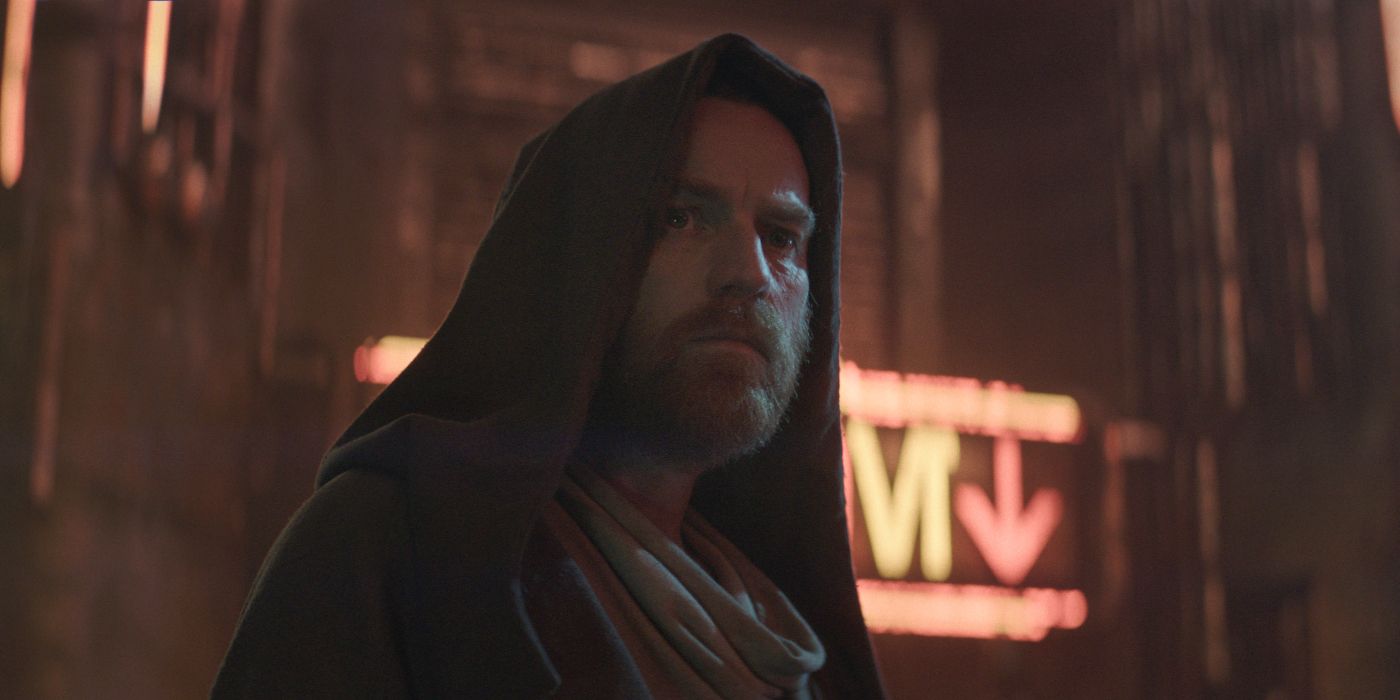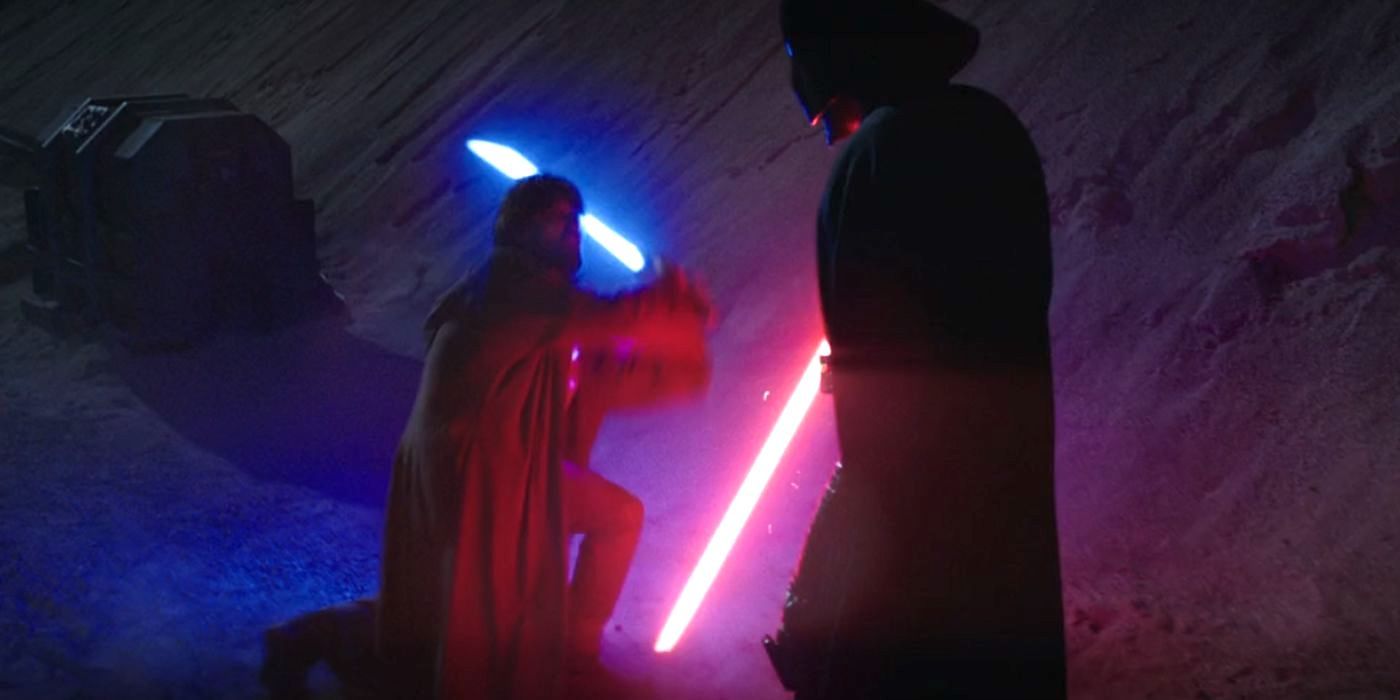Editor's Note: The following contains Obi-Wan Kenobi spoilers.How many times have we heard the phrase, "attachments are forbidden for Jedi?" Throughout the entire Star Wars canon — both before and after the Expanded Universe was rebranded as "Legends" — this phrase has been uttered in comic books, animated series, television shows, feature films, and video games alike, especially those connected to George Lucas' Prequel Trilogy. Even as recently as in The Book of Boba Fett (which takes place years after Return of the Jedi), Luke Skywalker (Mark Hamill) forces Grogu to choose between his Jedi training and his connection to the Mandalorian Din Djarin (Pedro Pascal). This is obviously a recurring theme throughout the Jedi Order. Yet, the most recent Disney+ limited series Obi-Wan Kenobi, which is set years prior to George Lucas' original film, has challenged this idea, and it seems to make a pretty good argument.
Often the rationale for why Jedi are forbidden to have attachments is that those attachments will eventually cause the Jedi to experience grief, fear, anger, jealousy, and a host of other negative emotions that may better tempt them to the Dark Side of the Force. This is, of course, exactly what happened to Anakin Skywalker (Hayden Christensen) at the end of Revenge of the Sith when he turned from his status as a Jedi Knight to become the Dark Lord of the Sith known as Darth Vader. Had Anakin not had such a deep connection to his wife Padme (Natalie Portman), and had he not been so afraid of losing her, he might have never been seduced to the Dark Side by Emperor Palpatine (Ian McDiarmid) in the first place and instead may have worked alongside Mace Windu (Samuel L. Jackson) and the other Jedi Masters to bring the Sith Lord to justice, effectively stopping Order 66 and the fall of the Jedi entirely.
On the surface, Episode III gives good reasoning for why Jedi shouldn't have any attachments. By forgoing these relationships, the Jedi are kept on their strict mission and duty to the Republic rather than doing what Anakin (Matt Lanter) and Ahsoka (Ashley Eckstein) are known for throughout The Clone Wars, disobeying orders based on their own emotional response to their circumstances. After all, Jedi are to be compassionate enforcers of justice who wield the Light Side of the Force for the betterment of the galaxy, and what better way to do that than by being completely unhindered by anything that may keep them from that goal? However, an even more compelling counter-question might be, if the Jedi are so committed to spreading peace and justice throughout the galaxy, how can they do so effectively without caring for or attaching themselves to those they've sworn to protect?
Now, no one would argue that Jedi can't or shouldn't care or show compassion towards those they're protecting, that wouldn't make any sense and, honestly, would be a pretty dishonest argument. Throughout the Original Trilogy, Luke Skywalker holds a deep commitment and attachment to his friends, Princess Leia (Carrie Fischer), Han Solo (Harrison Ford), and Chewbacca (Peter Mayhew), not to mention the droids C3-PO (Anthony Daniels) and R2-D2 (Kenny Baker), and it only makes him stronger as he fights Darth Vader (James Earl Jones, David Prowse) and eventually Palpatine at the end of Return of the Jedi. Likewise, in Star Wars Rebels, Kanan Jarrus (Freddie Prinze, Jr.) and his significant other Hera Syndulla (Vanessa Marshall) make a solid team, and Kanan's attachment to her only makes them stronger. Yet, the Jedi Order's ban on personal attachments - which includes marriage and familial relationships - is one that seems to, more often than not, hurt more than it helps, and, as mentioned before, this seems to be proven time and again by the recent Obi-Wan Kenobi series.
As "Ben" Kenobi (Ewan McGregor) is hiding out on Tatooine, he refuses to use his Force-sensitive abilities so that he might stay hidden. He even goes so far as to let other Jedi be hunted and killed by the Inquisitors so that he can remain in anonymity, effectively turning his back on the Jedi way of life and his formerly strong connection to the Force. This is the same man who faced off against not one, but two Sith Lords prior and would soon face a third in Darth Vader. Throughout the limited series, Ben struggles to use the Force, even when his own life is threatened. It's only when the life of the young Princess Leia (Vivien Lyra Blair), the biological daughter of his former apprentice, is threatened that Kenobi is able to wield the Force once more. In fact, the longer the series progresses, the clearer this notion becomes. Ben Kenobi's rusty abilities only truly work when he connects himself to those around him, those who he genuinely cares about which, in this case, means Leia. In other words, only by creating genuine attachments does Ben truly become Obi-Wan again, taking up the Jedi cause once more.
Contrast this with the tragedy of Darth Vader. In The Phantom Menace, young Anakin (Jake Lloyd) is taken from his home on Tatooine, and in particular, he's taken from his own mother, Shmi Skywalker (Pernilla August). This event proved to be traumatic for Anakin, and as he grew, he returned to Tatooine just in time for his mother to die in his arms. This event was Anakin's first pull towards the Dark Side as he slaughtered the entire tribe Tusken Raider tribe who had abducted her (including women and children), and after years of fighting through The Clone Wars, he eventually succumbed to his temptations after constant prophetic nightmares regarding Padme's death in childbirth. Revenge of the Sith sees Anakin finally accept his pull towards the Dark Side, and it's arguably solely because he was told that attachments, even positive ones, were bad in nature. How many other Jedi could've avoided Dark Side temptations or forsaking the Jedi Order altogether if they were just encouraged to have healthy attachments rather than negative, all-consuming ones?
As Ben encounters his former apprentice in Obi-Wan Kenobi, he struggles, conflicted by his own feelings towards Anakin whom he thought was dead by his own hand. Sure, the obvious reason Ben loses against Vader is that he's out of practice, and because of that his connection to the Force is admittedly a bit weak (not to mention that Vader is arguably a lot stronger than Ben at this point), but this author would argue that maybe, just maybe, the real reason he loses this fight is that after all these years, his own attachment to Anakin has actually grown. After years of believing he had killed his own apprentice, condemning himself to exile as punishment (masquerading as "protecting Luke from afar"), Ben is unable to hurt Anakin again, especially now knowing that his greatest failure is still alive. It's possible that Ben believes there's still hope for Anakin, but more likely his love for his former "brother" keeps him from wanting to actively hurt him the same way again. This may even explain why he sacrifices himself in A New Hope.
But this isn't the only time that Kenobi's own attachments have interfered with a battle against a Sith Lord. After his master Qui-Gon Jinn (Liam Neeson) was killed in The Phantom Menace, Obi-Wan found the strength he needed to overcome Darth Maul (Ray Park). In fact, Obi-Wan used the same "high ground" move against Maul that Anakin attempted at the end of Revenge of the Sith, hence why Kenobi was able to defend himself against it. But the real point worth taking note of in this duel of fates is that it was Obi-Wan's attachment to his master that gave him the final bout of courage and strength that he needed to cut Darth Maul in two. This proves once more that, when used properly, attachments aren't necessarily bad for Jedi and may actually create a stronger Force connection for them. Without his strong attachment to Qui-Gon, it's possible Obi-Wan might have lost this fight.
But back to Obi-Wan Kenobi... It's only after Ben begins to allow himself to connect with Leia and genuinely care for her as a person (not just as another "hope" for the galaxy) that he is able to once again find his connection to the Force and use it to protect her. Of all the losses Kenobi has experienced in his life, his master Qui-Gon, his true love Satine Kryze (Anna Graves), and, of course, Anakin himself, he has continued to resist the Dark Side no matter how strong his attachments to these people were (proving that it's possible to have healthy attachments and resist the Dark Side, what a concept). Likewise, his connection to Luke and Leia helps him not only regain his Force abilities in Obi-Wan Kenobi but also allows him to prepare to transition to a higher plane as a Force ghost after sacrificing himself in A New Hope. Without his commitment to them as persons — not just their potential as Jedi - it's possible that Ben wouldn't have had the strength to sacrifice himself in this way.
Of course, much of this is speculation and theory, but it's abundantly clear that the bond that Ben Kenobi has with Leia throughout the recent Disney+ show is by design. Without it, his connection to the Force may have been stalled permanently. He kept her from falling to her death on Daiyu, and he kept her and Tala (Indira Varma) from drowning underneath the Fortress Inquisitorius all because of his ever-growing connection to her. Likewise, it was Ben's friendship with Leia's adoptive father, Bail Organa (Jimmy Smits) that encouraged him to pursue Leia in the first place, albeit under the conviction that she is just as important as young Luke (Grant Feely) is. But nevertheless, there's no doubt that there's a lot more to the idea of positive Jedi attachments than initially meets the eye in Star Wars, and although Anakin Skywalker is a cautionary tale about what it means to have an unhealthy view of attachment, Obi-Wan Kenobi is the perfect example of a man who knows how to balance his emotions and use his attachments to further pursue the Light Side of the Force.




